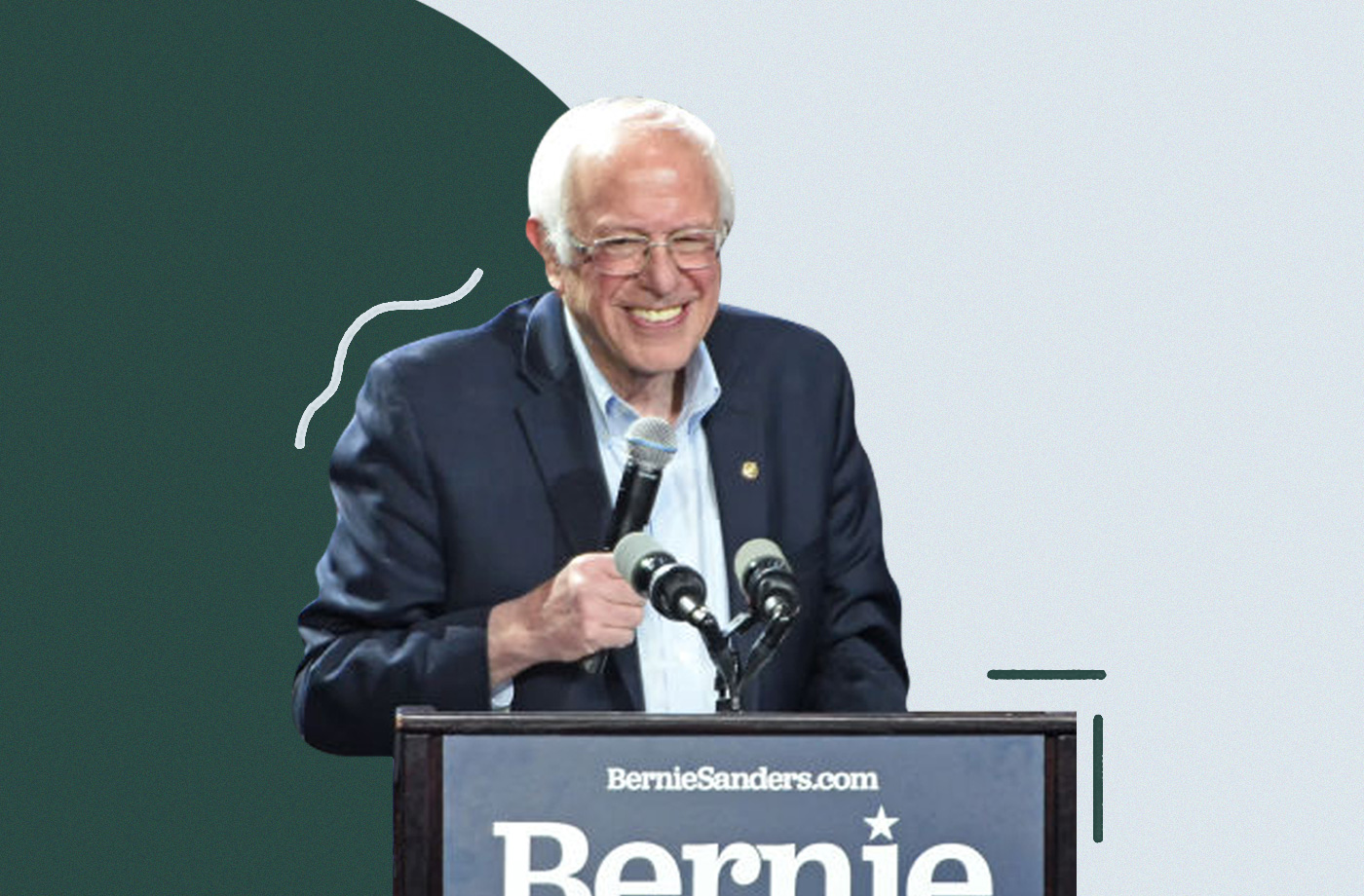
March 03, 2020 at 11:00AM by CWC
Just a few months ago, the field of Democratic presidential candidates looked kind of like a Saturday morning Barry’s class. In other words, it was incredibly crowded—albeit with a lot less Spandex. But now that only five of 28 hopefuls remain, one name in particular is emerging at the head of the pack: Sen. Bernie Sanders of Vermont. After winning the Democratic primaries in New Hampshire and Nevada—and missing the top spot in Iowa by a 0.1 percent margin—Sanders is now projected to win a majority of the 14 states voting on March 3, also known as Super Tuesday. Most notably, he’s showing big leads in polls out of California and Texas. If his progressive policies win over voters in these heavily populated states, he’ll be in a decent position to win more delegates than any other candidate going into July’s Democratic National Convention.
As a self-proclaimed democratic socialist, Sanders has D.C. experience on his side. He’s currently a third-term Vermont senator with 16 prior years serving in the House of Representatives, and in 2016 he ran for president, coming in second to Hillary Clinton in the primaries. The 78-year-old candidate is proving particularly popular with millennials, who are resonating with his progressive proposals to implement Medicare for All, cancel student debt, and push through the Green New Deal to halt climate change, among other things.
As it turns out, many of Sanders’ priorities are connected with another issue of great importance to millennials: wellbeing. Here, we examine his stances on six issues—healthcare, climate change, debt, equal rights, gun safety, and marijuana policy—all of which have either direct or indirect links to Americans’ overall wellbeing. Could a Sanders presidency potentially make us all a little bit healthier and happier? Read on to find out.
Before you cast your vote in the primaries, read up on Bernie Sanders’ policies
1. Healthcare
ADVERTISEMENT
ADVERTISEMENTKate Spade Autumn/Winter Sale |
One of the rallying cries of the Sanders campaign is that healthcare is a human right. As the author of the Medicare for All Act of 2019, the senator is committed to bringing all Americans premium-free, deductible-free, and copay-free care during his presidency. He says he’d do this by expanding the services covered under Medicare—the federal health insurance system that currently serves those age 65 and over—and making it available to all citizens, regardless of age. Every doctor in the country would be required to accept Medicare for non-elective care, and no individual would pay over $200 a year for prescription drugs. Not only would this make healthcare more accessible to everyone, but it would also give thousands of people the freedom to leave unhealthy jobs and marriages without having to worry about losing their insurance coverage.
Fifty-one percent of Americans support a single-payer, Medicare for All-style health system—as does fellow presidential candidate Sen. Elizabeth Warren (D-MA)—but critics say that there are some drawbacks. Namely, Americans would need to pay a healthcare income tax to fund such a widespread change to the system. But Sanders claims that most people would pay less in new taxes than they currently do on health insurance premiums, doctor’s visits, and prescription drugs annually, resulting in a net savings for many.
2. Climate Change
The climate crisis is perhaps the most significant issue of the 2020 election—without swift action, it’s putting us on course for food shortages, widespread extinction, the spread of disease, and millions of deaths. While the current administration doesn’t seem to be taking this threat seriously, the majority of Democratic candidates support the Green New Deal, a comprehensive package of proposed environmental reforms introduced by Rep. Alexandria Ocasio-Cortez (D-NY) and Sen. Edward J. Markey (D-MA) in 2019. In fact, Sanders and Warren co-sponsored it in the Senate. But Sanders’ climate plan references it more than any other co-sponsor in the Democratic race.
For starters, he’s committed to creating 100-percent renewable electricity and transportation systems in the United States by 2030 and completely “decarbonizing” the economy by 2050. As part of this goal, he’s proposing to create federal grants that help low- and moderate-income people switch to electric vehicles and make their homes more energy efficient, while also providing support and job assistance for fossil fuel workers.
Sanders also plans to invest in public land and conservation projects, as well as renewable and sustainable agriculture. And on the international level, he’s keen on rejoining the Paris Agreement and providing $200 billion to the Green Climate Fund, which helps less industrialized nations transition to clean energy.
Again, the big question is how to pay for such an ambitious plan. Sanders claims that the Green New Deal would pay for itself in 15 years time by suing, taxing, and charging fees to the fossil fuel industry, while eliminating $15 billion in subsidies paid out to that industry each year. He’d also aim to increase taxes on wealthy individuals and big corporations while also reducing military spending.
3. Financial wellness
Studies show that high levels of household debt are associated with higher levels of stress, depression, and blood pressure—and one of the major sources of debt in the U.S. is student loans. To this end, Sanders is vocal about his plans to cancel all student loan debt by imposing a tax on Wall Street. (Warren also supports student loan forgiveness, but with certain eligibility requirements.) This plan would particularly benefit women and people of color—two-thirds of all student loan debt in the U.S. is held by women, while Black Americans graduate with more student loan debt than white Americans and pay higher interest rates, on average.
While it might seem like wiping out $1.6 trillion in outstanding loans would be prohibitively costly for the nation, Sanders says that it would end up adding $1 trillion to the economy over the next 10 years, averaging around $3,000 per year in student loan payments for the average borrower. He’s also proposing to eliminate tuition and fees at public colleges and universities, community colleges, tribal colleges, trade schools, and apprenticeship programs. This would help future students have the option of a debt-free college education.
What’s more, Sanders is committed to wiping out $81 billion in medical debt, which would impact one out of every six Americans. He says he’d pay for this by taxing corporations that pay CEOs at least 50 times more than their average workers. Finally, he proposes capping consumer loan and credit card interest rates at 15 percent—the average credit card interest rate is currently more than 21 percent—as another means of helping Americans improve their financial wellness. While some of Sanders’ signature plans calls for the government to negotiate and cancel debt, he doesn’t specify the precise mechanism.
4. Equality for All
There’s not a great deal of detail regarding how Bernie Sanders’ policies would ensure equality for people of color, women, people with disabilities, and the LGBTQ+ community. But he does present some proposals that would specifically benefit marginalized groups.
For example, he is committed to restoring the right to vote for the one in 13 Black Americans who’ve been convicted of a felony, while he also plans on cutting the prison population in half by abolishing the death penalty, ending three-strikes laws that keep people in jail for minor crimes, and reducing sentencing. (People of color are vastly overrepresented in the prison system.)
He also vows to pass the Paycheck Fairness Act, which would ensure women equal pay for equal work, and the Equality Act and Safe Schools Improvement Act, which would protect LGBTQ+ adults and children from discrimination and harassment respectively. He’s seeking to undo several Trump administration actions, such as repealing the transgender military ban and restoring Title X funding to Planned Parenthood. And he’s looking to hire someone with a disability to create and run the National Office of Disability Coordination, a post that would expand and protect rights for others with disabilities.
ADVERTISEMENT
ADVERTISEMENTSports Direct Free Delivery on All Orders! |
5. Gun Safety
Bernie Sanders’ stance on gun safety has been described as “complicated.” But he’s since clarified many of his views while admitting to past mistakes. Like most of the other Democratic candidates, Sanders is in favor of expanding background checks while banning the sale and distribution of assault weapons and high-capacity magazines. He also supports legislation that keeps guns away from people convicted of domestic abuse and stalking.
6. Marijuana Policy
While the majority of Democratic candidates support federally legalizing cannabis in some capacity—with the exception of Joe Biden and Michael Bloomberg—Sanders is the only one who says he’d prioritize it in the first 100 days of his presidency. With this, he vows to wipe clean all past marijuana convictions and invest the profits from the legal marijuana industry into communities that were hardest hit by arrests during the War on Drugs. This would give these people the training and resources they’d need to start their own businesses, create farms, or otherwise profit from the industry.
Super Tuesday is taking place during Mercury Retrograde—here’s what’s in the stars for this fateful day. Before you cast your vote, brush up on each candidate’s stance on healthcare.
Author Erin Magner | Well and Good
Selected by CWC

ADVERTISEMENT
ADVERTISEMENTUp to 30% off Gift Sets |







